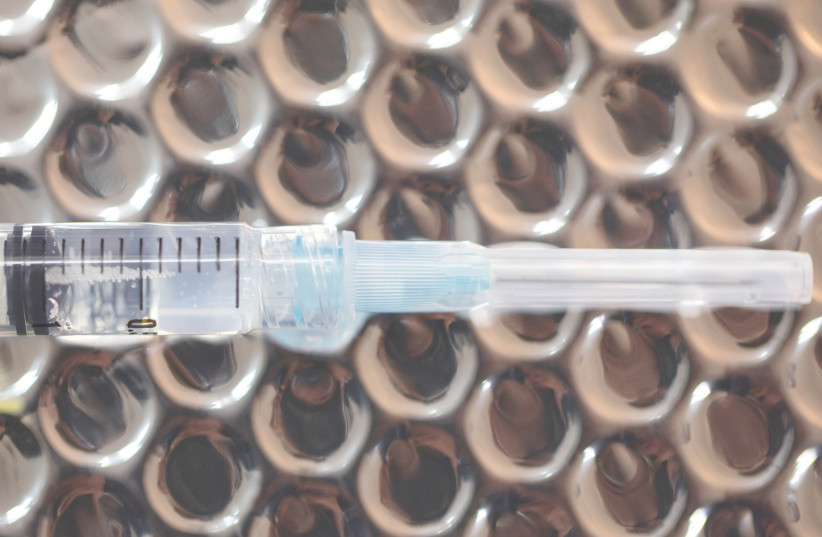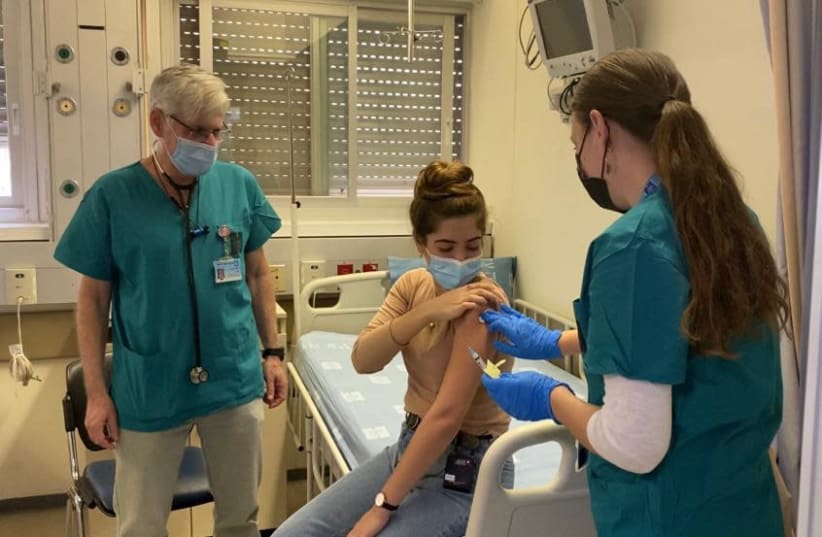Israel’s COVID-19 vaccine could be a game-changer for Israel and the rest of the world.
“There is innovation associated with the Israeli vaccine that potentially addresses this terrible virus better than other technologies,” said Dr. Jonathan Javitt, CEO of NeuroRx, the US pharmaceutical company that was given exclusive worldwide development, manufacturing and marketing rights to Israel’s BriLife vaccine over the summer.
The vaccine candidate was originally developed by the Israel Institute for Biological Research (IIBR), which operates under the auspices of the Prime Minister’s Office and works closely with the Defense Ministry.
The institute’s strategic and technical capabilities are shrouded in secrecy, but this week, The Jerusalem Post gained access to new data that show BriLife could be more effective against mutations and confer lasting immunity.
Moreover, preliminary snapshot data taken about a month ago as part of Israel’s Phase II BriLife trial showed that only one out of 200 patients who could be evaluated at that time had contracted the virus.

Prof. Yossi Caraco, director of Hadassah’s clinical research unit, who served as the national principal investigator for the trial, said this data should be looked at with “precaution,” but that it was also “promising” and even “encouraging.”
The BriLife vaccine is based on a platform used by pharmaceutical giant Merck & Co. for its Ebola vaccine, meaning it is a platform that has been validated around the world for several years and has been proven both safe and effective.
“We opted for an approach that is, on the one hand, modern and on the other, more conservative and less bold than the other vaccine makers chose,” said the father of Israel’s BriLife coronavirus vaccine, Prof. Shmuel Shapira.
BRILIFE IS a vector-based vaccine. The vaccine takes the vesicular stomatitis virus (VSV) and genetically engineers it so it will express the spike protein of the novel coronavirus on its envelope.
Once injected, it does not cause disease by itself. Instead, the body recognizes the spike protein that is expressed on the envelope and begins to develop an immunological response. Moreover, unlike other vaccines, this one binds to the exact cell in the lung that is targeted by the novel coronavirus.
“It’s like getting a virus like coronavirus without getting the disease,” Caraco explained. “Then, if you happen to be exposed to the real coronavirus, the immunological response that was triggered by the vaccine will prevent infection.”
Most standard vaccines, such as the measles vaccine, expose the immune system to a weakened version of the antigen, which teaches it to recognize and kill the disease.
Novel mRNA vaccines, on the other hand, use a sequence of genetic RNA material produced in a lab that, when injected, enters the cells and sparks production of the viral components that subsequently train the immune system to fight the virus.
Because the BriLife vaccine presents the immune system with a somewhat more complete version of the spike protein, this may give the immune system an opportunity to see more targets on the spike protein and therefore target more things on the virus – making it more effective against variants.
Neutralizing antibody tests performed recently in the IIBR lab showed that the vaccine’s antibodies maintain their neutralization capacity against all four major variants of concern: Alpha, Beta, Gamma and Delta.
IN THIS research, submitted for peer review by The New England Journal of Medicine, the IIBR researchers say they have shown for the first time the efficacy of the BriLife vaccine, which induced a neutralization response in the serum of some of the people vaccinated with it during Israel’s Phase II clinical trial when put up against all these variants. The researchers said this may be attributed to the vaccine’s unique genetic features.
BriLife “is a self-propagating, live-virus vaccine in which the spike protein of the vaccine appears to evolve in a manner consistent with the evolution of the SARS-CoV-2 virus in nature,” NRx explained in a press release.
“Thus, while variants may arise that support manual enrichment of the vaccine against those specific variants, the vaccine itself may continue to evolve in a manner that provides ongoing protection against variants.”
A small, separate set of data released in August through Israeli media showed that in contrast to the Pfizer vaccine that wanes after four to six months, when given a high enough dose of BriLife, it provides longer-term protection.
The report said that some 230 people who had received the highest dose of the Israeli vaccine were notified that they did not need a booster.
At the time, a source closely involved in the Israeli trial confirmed that these participants had in fact been told that they did not need to rush out and get a booster, though it was recommended that if more than six months had passed since inoculation, they should consider it as a precautionary step.
Finally, the BriLife vaccine may bind to ACE2 receptors that are also expressed by cells in the lungs or the nose, the same cells to which the actual COVID spike protein vaccine binds.
“We believe that this vaccine may create a level of tissue or mucosal immunity in addition to just providing normal antibody immunity, normal circulating immunity,” Javitt said.
FOR DEVELOPING countries that are struggling to vaccinate their populations, BriLife could also be transformative.
The vaccine does not need to be stored at below freezing temperatures like the mRNA vaccines. And, assuming it can be managed similar to the Merck Ebola vaccine, its shelf life will be longer, too.
The Ebola vaccines do not expire for three years and they can be thawed and stored for two weeks at around two to eight degrees. The Pfizer vaccines, in contrast, have a shelf life of around six months and, once thawed, last for only five days before needing to be tossed.
The World Health Organization has continually stressed that “until everyone is safe, no one is safe,” meaning getting people in poorer nations inoculated is essential to controlling the pandemic.
There is also a question of just how many mRNA booster shots people can take.
Some medical professionals have told the Post that there is some concern about potential side effects being underreported from the third shot.
Shapira said in a conversation with Yediot Aharonot that he knows from “my close circle and conversations” he has had with doctors that there are “significant” side effects that could be associated with the vaccine.
“I don’t think that they were covered up on purpose, but I think digging deeper into the possibility of side effects was less convenient” when running a mass vaccination campaign, he told the Post. “I don’t think anyone tried hard enough to look for side effects.... A year is a very short experiment.”
Another doctor said, “We have no history with mRNA vaccines and at some point, getting injections every six months could be a problem, so it would be good to have the option of another vaccine.”
Caraco noted that first reports show that the incidence of side effects is much lower for BriLife compared to Pfizer and Moderna and that these side effects are less severe.
So why does Israel not have this vaccine yet?
BACK IN August 2020, Shapira appeared on Zoom with then-prime minister Benjamin Netanyahu and told him and the public, “Six months ago, you dispatched us to bring a vaccine and antibodies to the State of Israel. We have carried out the mission, and are carrying it out in the best way possible. We have an excellent vaccine. This is the first vial of the vaccine; since last Thursday, we have a vaccine.”
But within three months, Shapira was at the Knesset complaining of “overregulation” that stopped IIBR from progressing.
According to Shapira, the 80 scientists working on the vaccine were not given the support they needed. They sometimes faced nonscientific, bureaucratic obstacles from politicians and others. The regulatory bodies worked slowly. Meetings were infrequent and often delayed and decision-making took too long.
Moreover, the government invested only NIS 176 million in the project, compared to the $3 billion budgets of other companies working on a COVID vaccine.
Others said that the Health Ministry was not to blame.
More likely, the reason for the delay was that Netanyahu struck a deal with Pfizer to secure millions of doses of the company’s vaccine in exchange for the country’s data on the vaccine rollout. The details of this deal remain shrouded in secrecy, but what is known is that by December 2020, the country’s valiant mRNA vaccination campaign had begun – and has not really ended since.
Over the summer, the defense minister gave NRx exclusive worldwide development, manufacturing and marketing rights for BriLife to help fast-track the vaccine once and for all.
THE COMPANY is expected to launch a Phase II/III registration study in December in Georgia and Israel to compare BriLife against an already licensed vaccine. If it works, it should only take a little time to gain at least emergency use approval, Javitt said.
It is expected that a portion of the 700,000 eligible unvaccinated Israeli adults will participate in this Phase II/III trial, bringing Israel closer to herd immunity.
Moreover, if the vaccine is successful, part of the deal with NRx is that the company will supply Israel with as many vaccines as it needs in perpetuity, which would secure the country in the event of another COVID wave or even potentially another similar pandemic.
Further, although NRx does not have a manufacturing facility in Israel, there have been multiple discussions about Israel establishing a plant specifically for the BriLife vaccine, which would make the country vaccine independent.
Given that COVID-19 is expected to last at least another year and that scientists have predicted another pandemic will hit again within our lifetime, Israel developing and manufacturing its own vaccine seems to be a matter of paramount importance.
The BriLife vaccine may not be the world’s first COVID vaccine, but it could be the innovative shot needed to end this pandemic.
Of course, only time will tell.
